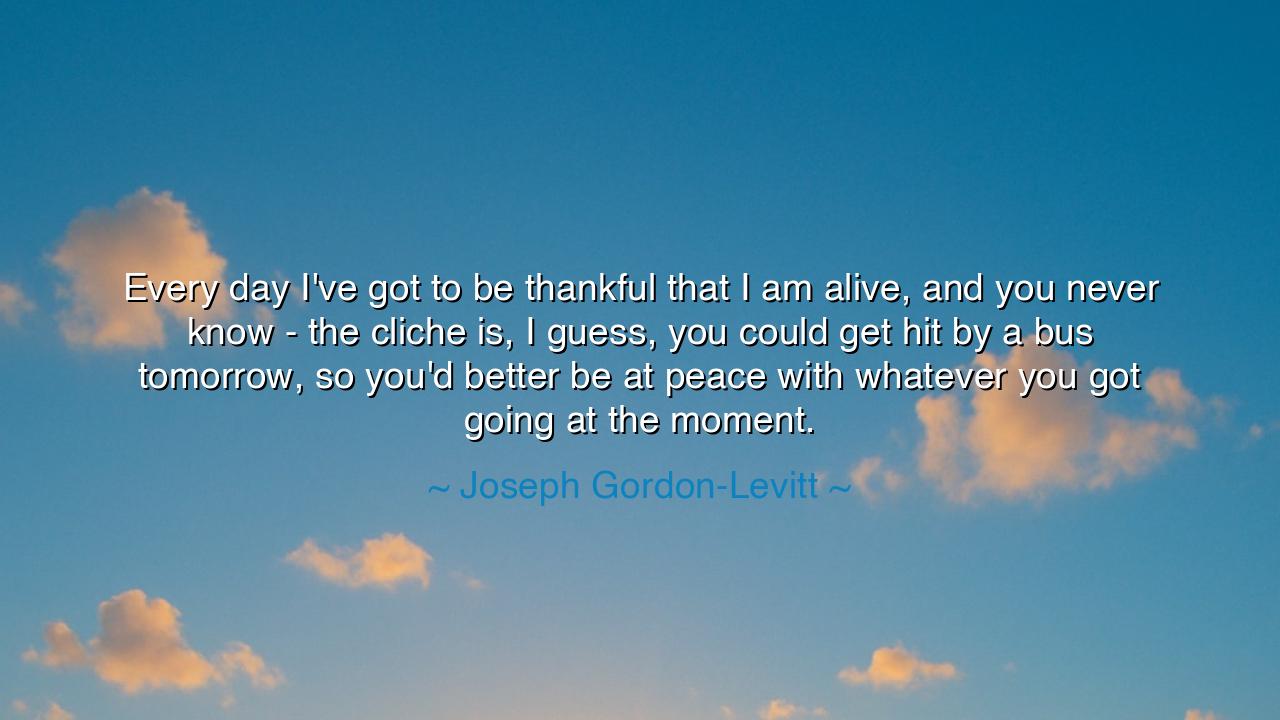
Every day I've got to be thankful that I am alive, and you never
Every day I've got to be thankful that I am alive, and you never know - the cliche is, I guess, you could get hit by a bus tomorrow, so you'd better be at peace with whatever you got going at the moment.






The words of Joseph Gordon-Levitt, “Every day I've got to be thankful that I am alive, and you never know – the cliché is, I guess, you could get hit by a bus tomorrow, so you'd better be at peace with whatever you got going at the moment,” strike like a bell of mortality ringing across the ages. In them, we hear both the frailty and the splendor of human life: that existence is brief, uncertain, and fragile, yet every moment of it can be suffused with gratitude and peace. This wisdom is as old as the ancients, who often reminded themselves that the shadow of death walks always beside us, and thus we must learn not only to live, but to live well.
To be thankful that I am alive is no small teaching. For many pass their days in forgetfulness, taking the breath of morning as though it were a guarantee. Yet the wise know that each dawn is a gift, each heartbeat a treasure. The Stoics of Rome, like Marcus Aurelius, wrote daily reminders that they might not see another sunrise, and so they must honor the present day. Joseph’s words carry this same spirit — that to awaken alive is already a reason for thanksgiving, before we have earned wealth, acclaim, or even joy. To live is the beginning of all blessings.
And then comes the reminder of uncertainty: “you could get hit by a bus tomorrow.” Though phrased in humor, it bears the weight of truth. Death often comes not with warning but suddenly, without regard for our plans or desires. The ancients expressed this with the phrase memento mori — remember you must die. Not to bring despair, but to awaken us to urgency. For if tomorrow is not promised, then today must be embraced fully. Each act of kindness, each word of love, each step toward one’s purpose gains sacred weight when seen against the uncertainty of tomorrow.
History gives us a clear example in the life of Anne Frank. In her secret diary, written under the shadow of war and looming death, she still found cause to rejoice: in the beauty of a tree outside her window, in the hope of a better world, in the sheer gift of being alive for one more day. Though her life ended young, her words endure, reminding us that even when tomorrow is uncertain, peace and gratitude can still be chosen in the moment. Joseph’s words echo this same truth: do not wait for security or long years to find peace; claim it now, while breath remains.
The teaching also calls us to be at peace with whatever you got going at the moment. This is not surrender, but wisdom. Many live in torment, forever unsatisfied, endlessly striving for more, and in doing so they squander the life that is already theirs. To be at peace does not mean abandoning ambition, but rather embracing contentment with the present — even as we build for the future. The Buddha taught that desire unbounded brings suffering, while gratitude brings peace. In Joseph’s reflection, this ancient teaching finds a modern tongue: if death may come tomorrow, then let your heart be reconciled with today.
The lesson is clear for all who hear: do not postpone gratitude, nor delay peace. Begin now. Rise each morning and give thanks for life itself. Speak kindness while you can. Pursue your work with diligence, but do not wait for its completion to be at rest in your spirit. Let no day end without reconciliation, for the bus of fate may arrive unannounced. Life is brief, and that brevity is what makes it beautiful.
As practical action, let us practice daily remembrance of life’s fragility. Each dawn, name one thing for which you are thankful. Each evening, release bitterness so your heart may rest in peace. Live with urgency, but not with haste — urgency that knows tomorrow is uncertain, and peace that cherishes the gift of today. In this rhythm of gratitude and awareness, we prepare ourselves not for endless years, but for meaningful ones.
Thus, Joseph Gordon-Levitt’s words join the chorus of the ancients: be thankful, for you are alive today; be at peace, for tomorrow is unknown. This is the way to live not in fear of death, but in honor of life. And when the final moment comes, we may depart not with regret, but with the quiet joy of one who has truly lived.






AAdministratorAdministrator
Welcome, honored guests. Please leave a comment, we will respond soon